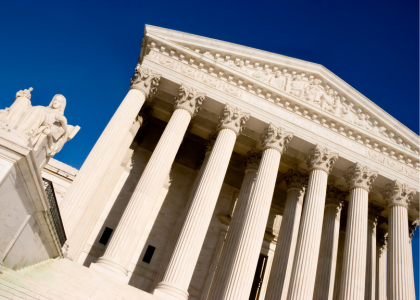Supreme Court Clinic wins a case at the high court

When the U.S. Supreme Court decided the case of Thompson v. United States in March, the justices’ unanimous decision brought relief for the defendant in the matter – and it was the latest victory for members of UCLA School of Law’s Supreme Court Clinic.
Founded by Stuart Banner, the Norman Abrams Distinguished Professor of Law, the clinic brings together students and faculty members to work together on real cases, representing clients who otherwise would not have the resources to pursue matters before the Court. Students hone invaluable skills in appellate legal practice as they help to research and draft petitions for certiorari and briefs on the merits. And UCLA Law faculty experts from a range of disciplines participate in writing briefs and preparing for arguments.
Since 2011, attorneys from around the country have turned to the clinic for support, drawn by the uncommon strength of its success. In 14 years, the clinic has taken eight cases to the Court, with a ninth set for the next term, and won four – a track record that would be impressive at most major law firms.
“There’s no better way for students to learn about the Supreme Court than to litigate in it,” Banner says. “And the work they do is genuinely important for our clients.”
In Thompson, the clinic represented Patrick Daley Thompson, a former lawyer and former Chicago alderman (whose grandfather and uncle, both named Richard Daley, were both mayor of Chicago). He had been convicted under a federal statute that prohibits making a “false statement” to several federal agencies and financial institutions. The issue was whether a person can be convicted under that statute if the statement is misleading but not false.
In Spring 2024, students researched and wrote the petition for the Court to hear the case. After it agreed to do so, Banner and his outside co-counsel, Chicago lawyer Chris Gair, collaborated on the merits briefs and preparation for oral argument, which Gair delivered in January. Two months later, the court issued a 9-0 decision, ruling that Thompson’s statement actually had to be false for him to be convicted. (The Court’s opinion and all the briefs are available here.)
Gair represented Thompson since learning “that he was under investigation for tax fraud and lying to the FDIC about a loan.” The lawyer recounts how Banner reached out to him after Thompson was convicted in 2022 and then lost at the U.S. Court of Appeals for the Seventh Circuit. Banner, he says, “had read the case and realized that the Seventh Circuit’s holding – that the statute at issue that prohibiting false statements also covers true but misleading ones – was in conflict with a Sixth Circuit decision. Because a circuit split is one of the prime bases for the Supreme Court granting cert, he proposed that we work together to pursue a cert petition.”
In Banner – a renowned legal historian, member of the UCLA Law faculty since 2001, and former law clerk for Justice Sandra Day O’Connor on the Supreme Court – Gair found a seasoned and savvy partner in preparing his case for the next level. “Stuart drafted an excellent petition, and the Supreme Court took the case,” Gair says. “His knowledge and experience was absolutely vital to framing the issues, and his connections in the Supreme Court advocacy bar sharpened the arguments through a series of moot courts. Thanks to his work, I felt completely prepared for the argument.”
For students, the experience was priceless – and a key part of their legal education. “It was an honor and a pleasure to be a small part of the work on this case,” says Nicholas Wilson ’24, who has since graduated from UCLA Law and is clerking on a federal circuit court, now applying what he learned at one of the highest levels of legal practice.
“Working with Professor Banner was a delight. He is one of the smartest people I have ever worked with, but also one of the most down to earth. I learned so much from his Supreme Court knowledge and writing expertise. His kind feedback made me a better writer and a better advocate. It can be hard to say what leads to success or failure at the Supreme Court. But in this case, I am sure that the team would not have had success without Professor Banner's clear-sighted leadership.”
Next up for the clinic: another case at the high court. In April, mere weeks after deciding Thompson, the Court granted cert in another of the clinic’s cases, Villarreal v. Texas. The issue is whether a criminal defendant’s Sixth Amendment right to counsel includes the right to talk about the defendant’s testimony with defense counsel during an overnight recess. Students wrote the cert-stage reply brief, the work for the merits brief is happening over this summer, and the oral argument – which Banner will deliver himself – will take place in the fall.